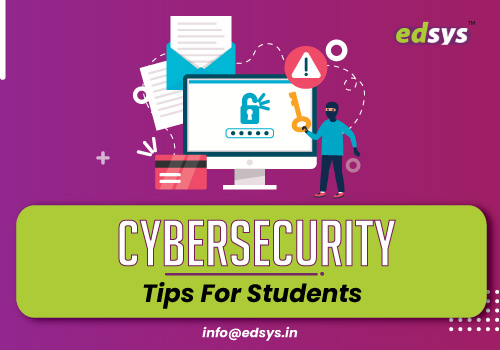
Teacher App - Class Schedule & Attendance Management App

Parent App from Edsys

Best School Bus Tracking System

Cashless School - For Smart Schools of Tomorrow


Sign Up and Recieve the Latest News
Don’t Worry, We Don’t Spam

No matter at home or school, cyber security tips have a significant role in a student’s life. As the present situation has demanded students to move into a digital learning space, they are spending a considerable time online every day. Even when teachers and parents are trying it hard to assure maximum safety in today’s virtual learning space, still there are loopholes that might land them into trouble.
Get Best Free Student Apps (Check it Now)
So, it is now the extra responsibility of parents and teachers to have an eye on the kids and protect them from the unwelcomed incidents through fruitful tips and advices. Here we are helping you out by discussing some of the crucial areas that students need to have a look at and important cyber security tips to assure a safe online learning experience.
1. Use encrypted websites and apps:
Encryption is the best way to protect any data that is sent online. This brings the necessity of using websites and tools that encrypts data to safeguard from network snoopers, hackers, and third parties.
So, use only websites with URL that begins with “https” to protect from data leaking. Similarly, have a look at the privacy policies of the apps before starting to use it.
2. Create unique and strong passwords:
It is good to have a password manager to create complicated passwords which has a lot of relevance when kids stay online.
Hackers can crack weak passwords in milliseconds and the students’ sensitive data if any will be at risk. So always invest on spending unique and strong passwords for all accounts that are created online.
3. Think before you click:
This is a quite simple but important tip or advice that can be given to a student who is spending time online. This will give them a second chance to double check about what they are going to click and know if it is necessary or safe to do so.
Never click on suspicious links that are sent by strangers and do not reply to messages from unknown sources.
4. Be careful about what you share:
Kids should be responsible about what they share online as the impact may be big at times.
For instance, simple mistakes like posting the picture of the driving license after passing the test, or a snap of the boarding pass when going for a trip or sharing details about credit cards may land them in trouble. There are many reported cases of identity theft by using the sensitive details that people share online.
5. Secure your social media:
Always make sure that students stay protected while using social media. Have a check on the privacy settings on the account to ensure what data is being shared and with whom.
For instance, setting the FB account to ‘Visible to friends only’ is the best way to protect data that are shared from strangers. Similarly, the Twitter account can be set as ‘protected’ so that those who are followed by the students can only see their data.
6. Use a VPN:
This is always a good choice to protect the internet traffic of students from hackers who are waiting to steal passwords or other sensitive information. A VPN on institution’s network for educational tasks can help protect the data safety of students.
Similarly, a VPN can encrypt an unsecure Wi-Fi connection to make it safe for students who are learning remotely from cafe, home or coffee shops.
7. Be watchful about phishing scams:
There are lots of reports coming everyday of people being trapped by phishing emails. It may look tough initially but with practice and by applying common sense, it is easy to identify such scams.
Emailing from sources that look genuine and making people share sensitive data like card details or passwords is their main idea. Be watchful about such scams and never ever share personal data without double checking the source of an email.
Also read: 25 Alternatives to Zoom for Classroom Teaching
8. Lock up and shut down:
It is important to keep the devices being used like mobile, tablets or laptops close to the person or in safe place. Never leave it open so that someone else can use it and impersonate or retrieve data from it.
Keep the devices protected with a password or thumb scan and always log out and shut down after use, especially when leaving it alone. Also do not leave the devices unattended in a public place.
9. Check out terms and conditions:
Please be sure to go through the terms and conditions before signing up on an app, a social media account or websites. Some of them can trap individuals by collecting contact details, use it for purposes that were not intended or scan the face, access browser history and so on.
So, think twice before signing up on an app that accesses sensitive information that may cause a future risk.
10. Do not use unsecured Wi-Fi sources:
This is a common mistake that students do especially when they are on public places. Never use unsecured Wi-Fi sources which can cause the data that is sent online to get trapped by a stranger.
It is always safe to use mobile data or use Wi-Fi only when it is protected, or when we are very sure about the source.
11. Safeguard the personal information:
Students should be taught about being responsible about their personal information. It is important to double check on what information is shared, to whom and what all impacts it can make.
Sharing email ids, passwords etc with others can allow them to impersonate on wrong grounds. For instance, even sharing a Netflix account with a friend that is not trustworthy can land kids in trouble.
12. Always have a recovery plan:
Even when all precautions are taken, there can be odd cases when mistakes happen. In such situations, there is no room to stay panic but react and respond on an emergency basis and seek the next steps to solve the problem.
Talk with parents or teachers regarding what to do next if a data breach has occurred. Keep a back up plan ready to overcome such possible scenarios.
Final Thoughts
Hope these important cyber security tips for students and related precautions will help parents and teachers to safeguard the online learning experience of students whether at home or in school.
Simple hacks like double checking before downloading a file or app can avoid the unwanted risks to the device and data. Just like cyber security, data security has the same relevance. And that is the reason why there should always be a backup for the important databases or files.
Just like the data and privacy protection, things like blocking the bullies should also be handled with enough relevance. For instance, there can be a situation where another student from the online class can trouble your kid.
Get Best Free Student Apps (Check it Now)
Make them aware of such possibilities and advise them to report the incident to the teacher or talk with you (parents) rather than trying to handle it alone and landing in unwanted troubles.
Knowing the possible vulnerabilities and risks in advance will surely help students to be careful when spending time online and thus protect themselves on a great extent.
Keep these cyber security tips in mind and stay safe online!


15 Best Free Apps for Online Teaching
Apr 3, 2023
40 Motivational Movies For Students in Hindi
Mar 2, 2023
12 Must Have Lesson Planning Apps for Teachers
Feb 16, 2023
International Education Day 2023: A Global Celebration of Learning
Jan 20, 2023
15 Best Learning Apps for Adults
Aug 17, 2022
14 Best Spanish Learning Apps for Students
Jul 21, 2022
12 Best Learning Apps for 3rd Graders
Jul 19, 2022
12 Awesome Learning Apps for 4th Graders
Jul 14, 2022
Top 12 Free Educational Apps for Students
Jul 13, 2022Explore Our Extensive Researched Educational App Directory
Visit Now